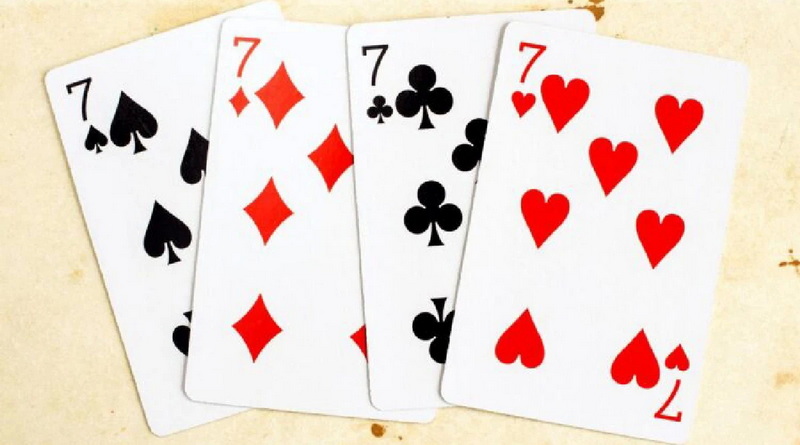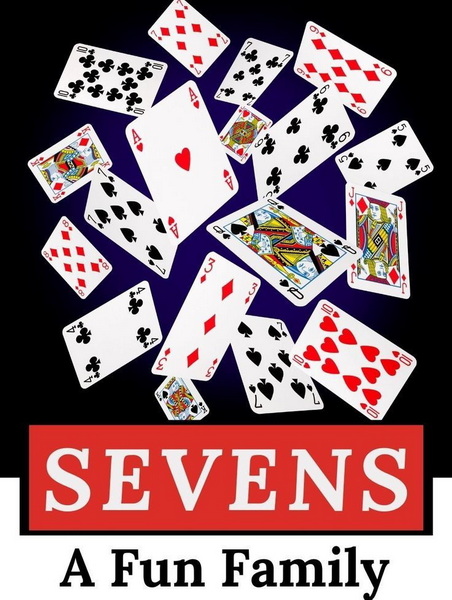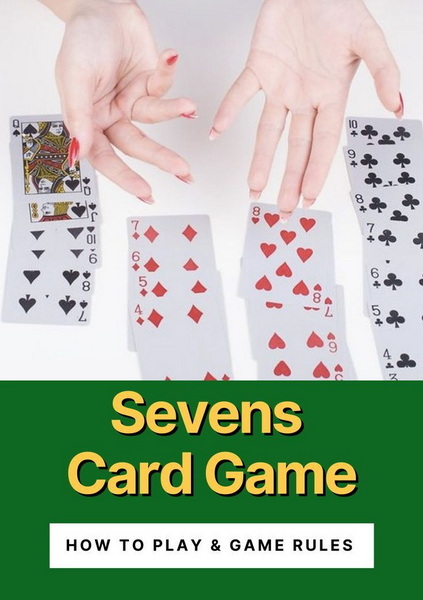Content Menu
● Objective of the Game
● Equipment Needed
● Setting Up the Game
● Starting the Game
● Gameplay Mechanics
>> Playing Cards
>> Skipping Turns
>> Ending a Round
● Scoring System
● Strategies for Winning Sevens
>> Hold Key Cards
>> Observe Opponents
>> Play High or Low
>> Balance Your Hand
>> Bluffing and Misdirection
● Variations of Sevens
● Advanced Strategies and Tactics
>> Card Counting Techniques
>> Timing Your Plays
>> Collaborating with Other Players
● Social Aspects of Playing Sevens
>> Creating a Fun Atmosphere
>> Learning from Others
● Conclusion
● Common Questions About Sevens
>> 1. Can Sevens be played with more than one deck?
>> 2. What happens if two people have the seven of diamonds?
>> 3. Are there any age restrictions for playing Sevens?
>> 4. Can you use Jokers in Sevens?
>> 5. How do you score in Sevens?
● Citations:
Sevens, also known as Fan Tan or Parliament, is a popular card game that combines elements of strategy and luck. This game can be enjoyed by 3 to 8 players and is suitable for players of all ages. In this article, we will explore the rules, strategies, and nuances of the Sevens card game, ensuring you have all the information you need to play and enjoy this engaging game.

Objective of the Game
The primary goal in Sevens is to be the first player to get rid of all your cards. Players do this by playing cards onto a central tableau in a specific sequence based on the rank of the cards. The game is not only about discarding cards but also about blocking opponents from playing their cards effectively.
Equipment Needed
To play Sevens, you will need:
- A standard 52-card deck (some variations may include Jokers as wild cards).
- A group of 3 to 8 players.
- Optional: Poker chips for betting or scoring purposes.
Setting Up the Game
To set up Sevens:
- Shuffle the deck thoroughly.
- Deal all cards evenly among players. It's acceptable if some players have more cards than others.
- Players should keep their hands hidden from one another.
Starting the Game
The player holding the seven of diamonds typically starts the game by placing it face-up in the center of the table. If no one has the seven of diamonds, then the next closest card in that suit can initiate play.
Gameplay Mechanics
Playing Cards
Once the game begins, players take turns playing one card at a time in a clockwise direction. The following rules apply when playing cards:
- A player must play a seven to start a new row for each suit.
- Players can add cards that are one rank higher or lower than an existing card of the same suit already on the tableau.
For example:
- If a seven of hearts is played, players can then play either a six or an eight of hearts.
Skipping Turns
If a player cannot play any card from their hand, they must skip their turn. In some variations, players may be allowed to pass up to three times before they are required to play.
Ending a Round
The round ends when one player successfully discards all their cards. At this point, remaining players tally points based on unplayed cards in their hands.
Scoring System
While scoring can vary based on house rules, a common method includes:
- Numbered cards (2-10): 5 points each
- Face cards (Jack, Queen, King): 10 points each
- Aces: 15 points each
- Jokers (if used): 50 points each
The aim is to have the lowest score at the end of multiple rounds.

Strategies for Winning Sevens
Winning at Sevens requires both strategic thinking and adaptability. Here are several strategies to improve your chances:
Hold Key Cards
Retain important cards like sixes and eights as long as possible to control gameplay and block opponents from progressing.
Observe Opponents
Pay attention to what cards other players are playing; this can provide insight into their hands and help you make informed decisions about your moves.
Play High or Low
If possible, play from either end of your hand (very high or very low) to maximize your options for future turns.
Balance Your Hand
Be cautious about holding onto cards for too long; this could leave you with unplayable cards later in the game.
Bluffing and Misdirection
While Sevens is primarily a game of skill, psychological tactics can also play a role. Sometimes pretending you have fewer options than you do can mislead opponents into making poor decisions.
Variations of Sevens
Sevens has several variations that can change gameplay dynamics:
- Jokers as Wild Cards: In some versions, Jokers can be used as any card, adding an extra layer of strategy.
- Multiple Decks: For larger groups, multiple decks can be used to accommodate more players.
- Different Starting Cards: Some variations allow other sevens or even specific face cards to initiate play instead of just the seven of diamonds.
Advanced Strategies and Tactics
As you become more familiar with Sevens, consider these advanced strategies to enhance your gameplay further:
Card Counting Techniques
Developing an ability to remember which cards have been played can give you a significant advantage. By keeping track of what suits are still available and which ranks are missing from each suit, you can make more informed decisions about which cards to hold onto and which ones to play.
Timing Your Plays
Timing is crucial in Sevens; knowing when to play certain cards can shift momentum in your favor or hinder your opponents significantly. For example, if you notice that an opponent is close to winning but lacks specific ranks in their hand, consider holding onto your high-ranking cards longer to block them effectively.
Collaborating with Other Players
In casual settings, forming temporary alliances can be beneficial against stronger opponents. If two players work together strategically by blocking others while allowing each other opportunities to discard their own hands first, it can lead to exciting gameplay dynamics.
Social Aspects of Playing Sevens
Sevens isn't just about strategy; it's also a social game that encourages interaction among players:
Creating a Fun Atmosphere
The informal nature of Sevens makes it ideal for gatherings and parties where laughter and camaraderie thrive. Engaging in friendly banter while playing can enhance everyone's experience and make for memorable moments.
Learning from Others
Playing with different groups allows you to learn new strategies and house rules that may vary significantly from what you're used to. This exposure not only improves your gameplay but also enriches your understanding of how diverse card games can be across cultures and regions.
Conclusion
Sevens is an exciting and strategic card game that offers endless fun for groups of friends and family alike. With simple rules yet deep gameplay mechanics, it's perfect for both casual gamers and those seeking a more competitive experience. By mastering the strategies outlined above and understanding how to navigate through gameplay effectively, you'll increase your chances of winning while enjoying every moment spent with fellow players.

Common Questions About Sevens
1. Can Sevens be played with more than one deck?
Yes, Sevens can be played with multiple decks if there are many players involved.
2. What happens if two people have the seven of diamonds?
The player who deals first will determine who plays first if both hold that card; typically, it goes clockwise from the dealer.
3. Are there any age restrictions for playing Sevens?
No specific age restrictions exist; however, it is generally suitable for children aged 6 and up due to its simple rules.
4. Can you use Jokers in Sevens?
Yes, Jokers can be included as wild cards in some variations of the game.
5. How do you score in Sevens?
Scoring typically involves counting points based on unplayed cards remaining in each player's hand at the end of each round.
Citations:
[1] https://www.youtube.com/watch?v=lkluxn_ya98
[2] https://gathertogethergames.com/sevens
[3] https://vegasaces.com/tips/table-games/how-to-play-sevens-card-game/
[4] https://www.reddit.com/r/ClubhouseGames/comments/h9pup8/i_dont_understand_sevens/
[5] https://www.youtube.com/watch?v=sNSfHc1VBh8
[6] https://www.xkdisplay.com/how-to-play-the-card-game-sevens.html
[7] https://www.pagat.com/layout/sevens.html
[8] https://www.activityvillage.co.uk/sevens
[9] https://www.reddit.com/r/boardgames/comments/1difxsz/name_of_american_seven_card_game/
[10] https://www.reddit.com/r/ClubhouseGames/comments/h9pup8/i_dont_understand_sevens/
[11] https://www.youtube.com/watch?v=oYH5-Or5ik0
[12] https://www.youtube.com/watch?v=zAhNv7xpeYg
[13] https://www.adda52.com/rummy/how-to-play-seven-cards-rummy
[14] https://www.betus.com.pa/online-casino/the-wise-guy/tutorials/sevens-card-game-rules-and-how-to-play/
[15] https://playpartygame.com/card-games/shedding/how-to-play-sevens/
































